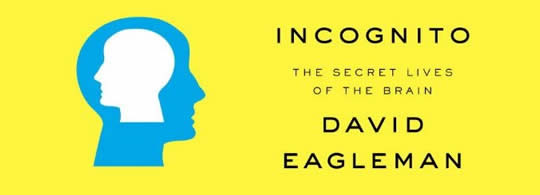Incognito by David Eagleman

Book Review: Incognito: The Secret Lives of the Brain by David Eagleman
Incognito is a look inside our heads: Eagleman, a neuroscientist at Baylor College of Medicine, looks at various aspects of how our brains work and how those functions manifest themselves in our behavior. In one chapter, he looks at our senses and how optical illusions can fool us. Unlike so many pop-neuroscience books today, though, Eaglemen doesn’t focus exclusively on how our brains don’t work as expected. Rather, he uses those occasional failures, like seeing color gradients that don’t really exist, to lead into a better understanding of how our brains actually do work.
In a chapter amusingly titled, “Mind: The Gap,” Eagleman describes “implicit memory” – our ability to perform actions like driving a car or typing without conscious thought. He points out that often our conscious mind can’t even duplicate the sequence of events in an action like changing lanes while driving, something we can do effortlessly while behind the wheel.
In the same chapter, Eagleman ventures into some of the territory mined in Malcolm Gladwell’s Blink. He describes how chicken sexers and airplane spotters could learn to perform their function without being able to describe how they knew what they were doing. Chicken sexers, for example, learned to differentiate male and female chicks only by being trained by experienced sexers. By examining chick after chick and being told whether they were right or wrong, a novice chicken sexer could eventually achieve a high level of accuracy. Despite their improved skill, these trainees, like the experts, were unable to describe exactly which characteristics of the chick allowed them to make the gender call. This type of “unconscious learning” is actually responsible for most human learning, which occurs not by formal training but by interacting with the world.
Perhaps the most significant chapter is the one which discusses how criminal and anti-social behavior is influenced by brain chemistry and genetics. Eagleman doesn’t discount the impact of nurture, though, and spends time discussing the fungibility of the “free will” concept. One interesting conundrum is “homicidal sleepwalking” – a rare but apparently real situation where a sleepwalker commits murder. Later, the perpetrator is unable to recall any details of the crime.
The more one acknowledges that criminal acts are either triggered or enabled by the individual’s brain, the murkier the whole issue of intent and guilt becomes. Eagleman concludes that free will doesn’t matter, at least for social policy. Ultimately, all actions are a combination of automated processes and decisions, and the actions themselves are what society can focus on.
Although I wouldn’t say that Incognito is a trove of information for marketers or managers, readers who enjoy exploring the intersection of brain, mind, and behavior will find the book interesting.
Amazon Link: Incognito: The Secret Lives of the Brain
Kindle: Incognito: The Secret Lives of the Brain

Sweet, I was looking for a new read, might check this one out!
Ditto
Got into my must read list!
I don’t really believe that will has such a little to do with our actions and behaviours. However, I will pick up this book and read through some arguments. I don’t mind being persuaded otherwise if the arguments are there